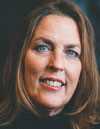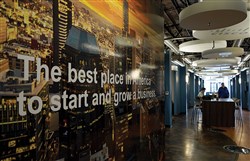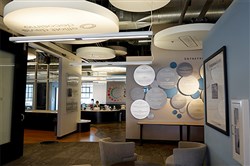VOL. 47 | NO. 8 | Friday, February 17, 2023
Helping to launch the next big success
By Lucas Hendrickson
Lenses can cause both distortion and focus. If you look at the world of entrepreneurship primarily through a pop culture lens, the distortion might get overlooked, what with the lights and the chairs and the nicknames and the potential for life-changing money offered by a so-called shark. But the distortion is most assuredly there.
The Nashville Entrepreneur Center more often seeks the focus route, helping to shape realistic expectations for potential founders with a solid idea, and giving them access to resources, mentoring and opportunity near-impossible to find on their own.
That focus comes from a leadership group with a varied set of skills and experiences, all the while realizing that the very idea of entrepreneurship has evolved over the organization’s 11-year history, even more dramatically over the past three.

Allen
“You know, I think it’s become sexy, and I don’t know that that’s a good thing,” says Jane Allen, the EC’s CEO since October 2019. “So I think when I say sexy, I think it’s become more commonplace.”
“I think that most young people today would look at it as a career option. It’s become so much more known, and it’s getting down into the high schools and the middle schools,” she continues. It’s just now a career path that quite frankly, I don’t think existed 10 years ago, and maybe not even five years ago.”
But even career paths that might now seem commonplace are still fraught with difficulties, especially if you’re betting your livelihood on an idea and your ability to execute it. Allen faced that in her previous work life, first as a lawyer, then creating the legal services staffing platform Counsel on Call in 2000.
“I’m just one of those entrepreneurs that started a business in Nashville, even though a lot of my business wasn’t in Nashville,” Allen says. “I started the company thinking it would help make the legal profession more inclusive. My thought process was to stay in the practice when life intervened, and I really didn’t know what it meant to run a business, didn’t know what the word entrepreneur meant. I just knew I saw a need and I saw a solution, and so just took a jump.
“But with that, I just started calling a bunch of people in our town. And every single person said yes, and they all are what I now know as an entrepreneur,” Allen continues. “I just knew ’em as founders who had started businesses, and I thought, ‘I wanna think more like you and learn from you.’ And all of them said yes. All of them met with me.

The Entrepreneur Center began in a small space on Lower Browdway and is now housed in the Historic Nashville Trolley Barns on Peabody Street.
-- Photo By Michelle Morrow | The Ledger“It was sort of a crash MBA course, so to speak. Flash forward, some of those same people were involved with the (Nashville Area) Chamber of Commerce when the Entrepreneur Center was born. Once they started doing individual giving, thankfully I was finally at the point where I had a little money, so I was able to donate money, but that was pretty much my involvement, until someone called about them needing a leader.”
The EC’s origins grew from a 2007 initiative called “Partnership 2010” that convened a task force to look at Middle Tennessee’s entrepreneurial landscape. The organization was launched as a 501(c)(3) nonprofit in 2009 and opened the doors to its first workspace in August 2010 at 105 Broadway, a section of the city still working through the aftermath of that year’s devastating flood.

Moore
At that time, Jason Moore was a recent transplant to Nashville from Atlanta, having moved here while working with the software-as-a-service company he helped found a decade prior. He knew his time with that company was coming to a close, and with another startup idea percolating in his head, sought out the EC’s founding CEO, Michael Burcham, to gauge interest in both Moore’s idea and the existence of the EC in general.
“In Burcham fashion, he immediately was gracious and said ‘It’s nice to meet you. Would you wanna come in and pitch?’ So I said, ‘Yep,’ Moore says. “And he said, ‘How about tomorrow at 8:30 a.m.? I said, ‘great,’ even though it was probably 10 at night, and I didn’t have a pitch. So I stayed up all night writing a pitch deck.
“I pitched and I felt decent about it, and he said, ‘I think you’re onto something with this company, but that is the worst pitch I’ve ever heard,” Moore laughs. “But his next response was actually probably the most important. He said, ‘I think if we’re gonna do what the Entrepreneur Center is supposed to do, then you’re exactly what type of entrepreneur we’re here to help.’”
Moore’s worst pitch went on to become Stratasan, a SaaS company working with hospitals and health care systems on market and data analytics. It was recently sold to Syntellis Performance Solutions.
Programming the lifecycle
Moore’s Stratasan arc is exactly the kind of case study/white paper the Entrepreneur Center can use these days to point potential founders down their own paths. It fits in nicely with what the EC can offer new and emerging entrepreneurs in terms of resources within its Trolley Barns location downtown, with coworking space, event rooms, and even studio space to create audio and video collateral for their efforts.
But the benefits of that changed landscape come in bringing more focus to the broader concepts of what the organization calls The Entrepreneur’s Lifecycle, the four phases of the entrepreneur’s journey: innovate, rapid growth, stabilize or exit and circle back.
To that end, the EC has created programmatic opportunities for founders to walk through those phases, from the self-actualization of seeing if they even want to pursue the entrepreneurial path with a program called PreFlight, all the way around the cycle to opportunities for giving back, be it through direct mentorship or investment.
Allen says that initial assessment – do I want to be an entrepreneur? – might be the most crucial.
“PreFlight success doesn’t mean they all get out of the program and want to be entrepreneurs,” she notes. “Success means people have looked at it objectively. They’ve looked at what it takes emotionally, physically, personally, but also economic opportunities.
“Because no matter how great an idea someone has, you know, unless you’re trying to start a nonprofit, does it have the ability to give you an income for you and whoever else is in your significant circle? And if so, how long do you think that would take?
“So I think part of our PreFlight program is an eyes-wide-open, know-what-you’re-walking-into situation.”

Cole
Brittany Cole, the EC’s current chief equity and inclusion officer, had pursued her own entrepreneurial leanings while forging a dozen-year corporate career with pharmaceutical manufacturer Pfizer. The Nashville native spent time creating an image consulting business while living in Chattanooga then New York that morphed into her current company, Career Thrivers. But when she returned home to Nashville after stepping away from Pfizer in 2019, she was unaware of the resources the EC had to offer.
“I’m a native, and I didn’t even know that the EC existed,” Cole says. “I had someone tell me about the EC and invite me over to tour it, and I was just so blown away that there was an actual space that is for founders.
“I decided around the same year to make the transition from FTE to FTE: full-time employee to a full-time entrepreneur,” Cole continues. “And my introduction or my kind of bridge, if you will, from full-time employee to a full-time entrepreneur actually was the Entrepreneur Center. I remember learning about the PreFlight program and that was the premise of the program was about deciding if you should leave a job or not. I had obviously already made that decision, but it was a great introduction.”
It’s a little bit of that uncovered gem idea that drives Allen and her team in creating programs for emerging entrepreneurs, not only to build the infrastructure, but showcase it as well. “I think Nashville is an amazing place to start a business,” Allen says. “I always said Nashville was the best kept secret back in the ’90s and early 2000s, and I always said the EC was Nashville’s best kept secret.
“With all of this growth and all of the people moving in, it’s still a town where people are willing to give you their time, and I don’t think that exists everywhere else,” she continues. “We have so many volunteers, advisers, and mentors that pour in to these founders. The secret sauce is the people. That’s what makes our community so vibrant and rich.
“Yes, it’s a wonderful boom city and you have health care and you have music and you have sports. But I think entrepreneurship is right there in the tapestry of our city as well,” Allen says. “I hope collaboration continues versus silos. There’s so much and so many moving in, if we can continue to work collaboratively as we look forward with so many new players in our city, in a variety of different ways, not just entrepreneurship.”
Tapping into local resources
However, the EC finds itself, operationally, benefiting from a certain amount of siloing, at least as far as the programs it offers.
As Nashville’s business landscape changed in the last decade, more need to focus what the organization could offer emerged. The response was the creation of industry specific programs for health care and the music and entertainment industries, along with the enhanced Phase 2 program InFlight for high-growth, yet still small team companies.
Earlier this month, the EC announced its newest program, Project FinTech, which will aid founders in the financial services sector to bring their product into that space.
Much like the organization’s other Project-branded efforts, the initial push for fintech leans not only on existing business and governmental partnerships, but also the expertise of “entrepreneurs in residence” to help guide that push.
“Part of our goal is to bring innovative solutions to our local business community,” Allen says. “And so we do look at where we are going in health care. In order to really be able to do that, we need the industry expertise to actually lead the programs, so for health care, we were fortunate to bring in Eric Thrailkill, who has 30 plus years in health care. He very much has the ear of what the health care community needs and where it’s going, as do the also the founders that come through our program.
“The same is true in fintech, for example, having [Core10 president] Lee Farabaugh and [FINTOP Capital managing partner] Joe Maxwell come on as EIRs is mind numbing, but it was a part of our business plan before we ever thought of doing it,” she continues.
“We have a business plan model that we run (these programs) through, and having strong leadership in that position to lead with the industry knowledge is essential, so that we are able to understand what the needs are.
“It’s the business community and entrepreneurial community coming together, and I really believe if you’ve got those two working, the investment community comes.”
EC alums like Moore see firsthand how the organization has learned while growing and expanding its scope, a fact he’s taking advantage of currently, running his new post-Stratasan startup through the InFlight program.

The Entrepreneur Center provides space for work, meetings and collaboration.
-- Photo By Michelle Morrow | The Ledger“Seeing the programs coming out of the EC, like Project Healthcare and the FinTech and the people that are leading those things, I can see now that they’ve taken the good from what we did, maybe left out the not-so-good or the ineffective or inefficient, and built products out of it, and it’s really cool to see,” Moore says.
“I’ve been on selection communities with EC, and there is a zero chance I would get in today in the same form that I got in right in September 2010. So I wouldn’t have been ready for Project Healthcare, but maybe I could have found my early home in InFlight or PreFlight or some other program that would be available today.”
That opportunity for focus, for learning something new in the midst of conveying experience to others, can be a driving factor for experienced mentors who want to give back, Allen says.
“I can get to certain times where I’m like, ‘oh, I’m tired of learning and growing. You know, maybe it’d be nice to just…be,’” she says. “But then again, that’s not what I’m called to do.
“Our programs have amazing results: 84% of those who have come and gotten through the program, still employ people or have had successful exits, and it’s continued to grow,” Allen continues. “Then being able to make sure we’re bringing those to our business communities. We really are trying to solve challenges. I would never call ’em problems, I’d call ’em challenges.
“Some of the founders just enrich my soul, and I feel I’m a better person because I’ve met them and had the opportunity to work with them. The same is true for people on my team,” Allen notes. “Selfishly, I hope they help make me better at not only my job – because I don’t really view it as a job, I view myself as retired – but they help me hopefully be better and in turn, hopefully I can help them on their journey in some way to grow and make a difference.”